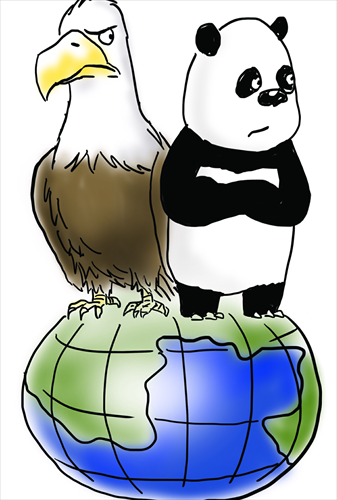US split on future relations with China

Illustration: Liu Rui/GT
As China has increasingly revealed its growing economic, diplomatic, and military strength in the period since the 2008-09 global financial crisis, the US consensus on China policy has eroded, sparking debate about future policy.
Even as the Obama administration rolled out its "rebalance" in 2011 to demonstrate the importance it attached to the Asia-Pacific, some of the core assumptions that have guided US policy under eight US presidents, from Nixon to Obama, have been called into question.
The first is that China reformed and modernized its economy post-1979, its GDP skyrocketed from $200 million in 1980 to $10.3 trillion in 2014. US policy has assumed that as China prospered and a middle class grew, political reform, if not democratization, would follow.
The second assumption has been that as it integrated itself into the globalized economic and political system, China, which has been a major beneficiary of the US-led system, would see its interests best served by being a "responsible stakeholder" in that system.
A growing chorus of US voices argue that the current US-China relationship, one of cooperating where possible and managing differences, needs rethinking. Some in the US, like Pacific Command Commander Admiral Harry Harris, argue that China seeks a hegemonic role in the Asia-Pacific. They recognize the complexities of the relationship but see China as more of a threat than a partner, one seeking alternatives to the open, rules-based international order.
Those in this camp call for containing China, strengthening US military capabilities in the Pacific as well as alliances and security partners, countering Beijing in the South and East China Seas, and denying technology exports. Some also advocate isolating China from regional trade agreements like the Trans-Pacific Partnership (TPP).
A variation of containment seeks to press China on human rights and democracy with the hope of creating a "color revolution." This logic is that a Western-style democracy would make China just like us. But in truth, regardless of its political system, nationalism would persist and China would still be a rising great power.
This approach is dubious on several levels. Unlike the Soviet Union, China is integral to a globalized economy, an integrated regional economy and the largest trade and investment partner of every US ally. How can it be isolated? The toothpaste is out of the tube. Beijing holds $1.3 trillion in US Treasury bonds, helping fund the US budget deficit.
It was a naive assumption to think that a rising great power like China would simply accept rules it had no say in making and not want a larger voice in shaping global institutions.
Another flaw in a containment strategy is the notion that US allies and partners in the region will align with the US in a confrontation with China. All actors are hedging against uncertainty, including the US and China. The US pivot is aimed at counter-balancing China, and is desired by US allies and partners in the region. But everyone's worst nightmare in Asia is having to choose between the US and China. Doubts about US reliability persist, but all know that geography will not change.
But there are also those who argue that rising Chinese influence is inevitable and that the US and China need to find a mutual accommodation. They support the US effort to counter-balance China, but argue that global and regional stability compel the US and China to cooperate where interests overlap - the global economy, climate change, terrorism, nuclear security, etc.
Some envision a variation of current policy, cooperating broadly, combined with a process of managing and narrowing differences. Others argue that an evolving Sino-US relationship will struggle to find a balance of interests, as Deng Xiaoping put it, "crossing the river by feeling for stones."
The US-China debate is part of a larger psychological and political challenge to US pre-eminence resulting from a polycentric world. The US has a hard time operating in a world where it is first among equals, and many are nostalgic for a unipolar world which is no longer possible.
Despite all the noise of the current US debate, I suspect the basic relationship between the world's two largest economies, both nuclear weapons states, need to find an acceptable balance of interests.
One aspect of this is developing a framework for strategic stability in regard to nuclear, missile, and global commons (like cyberspace and outer-space) issues. The US has enduring, long-term strategic interests in East Asia, yet the region is also China's backyard. Both need to answer the question: what Chinese role in the Asia-Pacific is acceptable to the US; and what US role is acceptable to China?
The degree to which the Sino-US relationship stays on a path that is more cooperative than competitive, whether the "Thucydides trap" can be avoided, is likely to rest on how three key unsettled issues - Taiwan, the Korea question, and the South China Sea disputes - are resolved.
At the end of the day, China policy is really part of a larger challenge facing the US: how to accommodate US interests to a transforming world in an increasingly polycentric system where power is diffused. For China, US policy is a challenge of how to define itself as a great power.
The author is a senior fellow of the Brent Scowcroft Center for International Security at the Atlantic Council and its Strategic Foresight Initiative.
opinion@globaltimes.com.cn. Follow him on Twitter at @RManning4